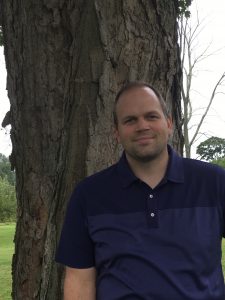Doctoral student Erik Freeman has won the Communal Studies Association’s 2018 publications award for “Best Article.” His article, “‘True Christianity’: The Flowering and Fading of Mormonism and Romantic Socialism in Nineteenth-Century France” appeared in the April 2018 issue of The Journal of Mormon History. Erik’s work was praised for demonstrating “the groundbreaking connections between socialism and the LDS movement.” He will receive the award at the Association’s annual meeting in October. Congratulations, Erik!
Graduate Research
Speaker Spotlight: Daniel Immerwahr by Megan Streit
At 4:30 PM on Friday, September 22, in the Wood Hall Basement Lounge, Daniel Immerwahr of Northwestern University will be inaugurating this year’s US Foreign Policy Seminar with a lecture entitled “No One Knows in America, Puerto Rico’s in America.”
First-year doctoral student Megan Streit here offers a brief and compelling introduction to the work of this innovative scholar.
Daniel Immerwahr is an historian who focuses on twentieth-century US through a global lens. Additional research interests include the history of capitalism and intellectual history. Though born near Philadelphia, Immerwahr’s research and scholarship have taken him abroad to India and the Philippines and he has lectured and taught at elite universities such as Berkeley and Columbia as well as at San Quentin State Prison. The son of a philosophy professor and theater director, Immerwahr began his academic career at Columbia University hoping New York City would kickstart a career as a jazz musician. Though originally immersed in the Columbia Architectural School, his coursework there introduced Immerwahr to Hawaii’s complicated history with the US government and this inspired him to explore US power and nation building. Immerwahr’s architecture professor, Gwendolyn Wright, advised him to go down to NYU and speak with her husband about the topic and soon enough Immerwahr found himself in conversation with Thomas Bender, a leading scholar on the historiography of the United States. Bender’s anthology, Rethinking American History in a Global Age, indicates the overlap in interest that the two shared. With these interactions we see how Immerwahr’s undergrad experience and academic influences evolve toward a focus on the US as a global force. Immerwahr earned a second B.A. as a Marshall Scholar at Cambridge and then a PhD at Berkeley. After a postdoctoral post at Columbia in 2011, he has taught at Northwestern as an assistant professor since 2012.
The organic evolution of Immerwahr’s research interests, from architecture to intellectual history and capitalism, serves as a testament to the journey of a historian. Embarking on his first book, Thinking Small, Immerwahr combines these interests to posit a resounding critique of community development as a political tool. Critical of US pursuit of grassroots development at home and abroad, Immerwahr’s focus ranges from the micro to macro and flawlessly weaves the two realms into a cohesive narrative on US empire and power. Thinking Small takes its reader on an exploratory examination of development as a tool both in the foreign and domestic arenas. Development is no simple topic nor endeavor. Affected by every political and sociological factor imaginable, development is an ongoing issue with no clear, blanket solution in sight. From climate, to demographics, to political structures, there are too many variables by country and region to impose a magical solution to poverty and wealth disparity. Historically, the American approach to catalyzing development at home and abroad has largely been the top-down structure, a “trickle-down” development theory if you will. While this approach has been well-intentioned, there have been several examples of unforeseen consequences that have actually hindered the communities they aimed to help. Large dams displace people, foreign donations can disrupt local economies, and new problems replace the previous ones. Immerwahr’s transnational approach shifts the focus from the elected elite to the everyday villager who understands the problem in a day to day lens.
Furthermore, there are additional issues seen in top-down development, one of formidable importance is that of corruption. With corruption we begin to see the political impact that social programs can elicit, a point which Immerwahr discusses at length in attacking the efficacy of government initiated development programs. Unfortunately, lesser developed countries often tend to also have less legitimate governments and less adherence to strict rule of law. Whether cause or effect, the lackluster economy incentives corruption and corruption dissuades investment in economy and the cycle spirals. This being said, foreign aid will not reach those it is intended to reach but instead, when the presence of poverty elicits continued donations from rich countries, the corrupt government is further incentivized to keep the people poor. Microloans and similar grassroots economic programs are prime examples of the bottom-up development that Immerwahr discusses for empowering the people to create the development of their local communities.
Scholarship
Thinking Small: The United States and the Lure of Community Development (2015) is Immerwahr’s primary piece of scholarship though his second major work, How to Hide an Empire: Geography and Power in the Greater United States, focusing on overseas territories of the US is forthcoming. Thinking Small is a masterful work that brings Immerwahr’s 2011 dissertation “Quests for Community: The United States, Community Development, and the World, 1935-1965” to a wider audience. The clear thread of evolution from dissertation to the expanded version of a book publication is that of community development. A buzzword over the last decade, the history of community involvement goes back much further in American history than this recent uptick in popularity suggests. As Immerwahr defines community development, “It’s a way of dealing with poverty by drawing on the participation of poor people. The idea is that the poor could improve their own conditions if only they could be brought together.”[1] The concept of grassroots societal improvement resonates strongly with foundational American values of mobility though occasionally at odds with America’s avid individualism.
While most narratives of communal development focus on their reach and impact within American society, Immerwahr’s Thinking Small adds the previously absent dimension of the international expression of this idea. Particularly as the Cold War began to ramp up, America took community building and refashioned it as a tool for containment via food aid in the 1950’s and 60’s. Immerwahr centers his work around India and the Philippines as his case studies. Immerwahr found there to be a lack in scholarship particularly around the relationship between the Philippines and the US and, apart from the attention it receives in Thinking Small, he did additional research and produced a piece titled, “Everything You Wanted to Know About the Philippines But Were Afraid to Ask.” The Philippines is featured further in his How to Hide an Empire work in which Immerwahr challenges the discourse on the murky status and history of the Philippines. Immerwahr describes this shift in thinking saying, ““What if, instead of writing about the Philippines as part of the history of foreign relations, we instead considered it part of national history? And what if, when we talked about the United States, we didn’t just talk about the contiguous part, but all of the land under US jurisdiction?”Here we see what an interesting new take on US empire we can look forward to in Immerwahr’s second book. Given the well reception Thinking Small has received, How to Hide an Empire should surely be a riveting examination of the sprawl of US imperialism and the nuanced politics that shade this discourse on empire building.
Immerwahr’s message in Thinking Small is not that community development is futile or inherently misappropriated but that these current challenges that America faces now that community development has turned stateside again are not new. Immerwahr stresses that community development is not the pleasant hand-holding slogan but rather, hard choices on far-reaching issues. Real change and improvement, the primary goals of community development, are not going to come without facing the critical issues of its motives and implementation that Immerwahr underscores. A concise book, Thinking Small creates constructive push back to the prevailing scholarship that is often enamored with community development. Immerwahr emphatically exposes the political band-aid that both the Left and Right have used community development as and criticizes the illusion of empowerment that this constructs. HIs approach and scholarship runs counter to the bulk of existing scholarship on this transnational topic and thus provides a fresh interpretation in the discourse of grassroots development.
In a show of true concern for his topic matter, Immerwahr has designated that all proceeds from the sale of Thinking Small go toward the NGO 350.org that aims to raise awareness of climate change, an issue in which human development efforts have played no small role and which grassroots development is directly impacted by. Finally, to ensure fascinating and lively dinner conversations, please treat yourself to Daniel’s thorough research on guano by watching his lecture on YouTube here: https://youtu.be/TnI4l6rFuHI
Bibliography
https://muse.jhu.edu/article/587535
http://faculty.wcas.northwestern.edu/daniel-immerwahr/dissertation.html
[1] https://www.dissentmagazine.org/blog/booked-1-whats-wrong-with-community-development
8/28 – 11th Annual History Graduate Student Research Conference
Conference Schedule – Monday, August 28, 207
All sessions held in the Class of ’47 Room in the Homer Babbidge Library
Session A: 1:15-2:45 pm
Panel One: Governance, Institutions, and Movements in New England
Chair: Danielle Dumaine
Nicole Breault, “Peace and Good Order in the Streets”: The Work of the Constable’s Watch in Eighteenth-Century Boston
Abdullah Alhatem, “The Domestic Slave Trade in New England”
Britney Murphy, “The Fall of Mount Trashmore and the Rise of Community Activism: Environmental Justice and the Politics of Inclusion, Bridgeport, CT (1991-Present)”
Commentator: Matthew Guariglia
Coffee Break – 2:45-3:00
Coffee, tea, assorted cookies
Session B: 3:00-4:45 pm
Panel Two: Power and Influence in World Affairs
Chair: Maggie Stack
Erik Freeman, “‘True Christianity’: The Flowering and Fading of Mormonism and Romantic Socialism in Nineteenth-Century France”
Frances Martin, “Who’s Watching the Clock? Rise of the Doomsday Clock as a Pop Culture Phenomenon”
David Evans, “False Harvest: U.S. Foreign Relations and the Dream of Agricultural Power during the 1970s”
Lauren Stauffer, “From the North to the South Atlantic: NATO and the Falklands War”
Commentator: Gabrielle Westcott
Keynote Address: 5:00 pm
Jonathan Chu
Professor of History, University of Massachusetts-Boston
Editor, New England Quarterly
“Wrestling with the Devil: An Historian Becomes an Editor”
2016 Commencement: Four Graduate with History PhDs
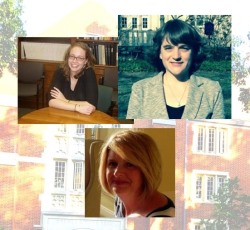 Doctoral dissertations must offer original contributions to knowledge and understanding. For historians this involves not only identifying fresh topics and source materials but exercising the diligence and imagination to reconstruct past lives and circumstances from necessarily fragmentary evidence. Their reward is to uncover unknown or forgotten aspects of the past, or to offer new and surprising perspectives on familiar subjects.
Doctoral dissertations must offer original contributions to knowledge and understanding. For historians this involves not only identifying fresh topics and source materials but exercising the diligence and imagination to reconstruct past lives and circumstances from necessarily fragmentary evidence. Their reward is to uncover unknown or forgotten aspects of the past, or to offer new and surprising perspectives on familiar subjects.
This past May, four scholars were awarded PhDs by the History Department, a number that should make a small liberal arts department very proud.
Two of these graduate students shed light on a pair of women who broke tradition and forged new paths personally and politically, another focused on the revelations of character and piety in the diary of an 18th century Congregational minister who despite inner doubts, brought peace to his flock. The dissertation of the fourth student examines the political, economic and cultural relationship between the United States and a region of Southern Italy over several centuries.
In her dissertation titled, “Janet Minot Sedgwick II and the World of American Catholic Converts, 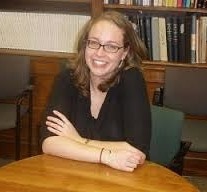 1820-1890,” Erin Bartram traces the history of the controversial conversion to Catholicism of Sedgwick. Raised by an elite New England Unitarian family. Sedgwick, who was born in New York City, found friendship and emotional support through her association with other female converts. Despite her family’s indifference (they eventually accepted her conversion) and what Bartram said were priests whose ideas “about gender and authority” conflicted with her own, Sedgwick found happiness and comfort with other converts and eventually worked to establish a Catholic school.
1820-1890,” Erin Bartram traces the history of the controversial conversion to Catholicism of Sedgwick. Raised by an elite New England Unitarian family. Sedgwick, who was born in New York City, found friendship and emotional support through her association with other female converts. Despite her family’s indifference (they eventually accepted her conversion) and what Bartram said were priests whose ideas “about gender and authority” conflicted with her own, Sedgwick found happiness and comfort with other converts and eventually worked to establish a Catholic school.
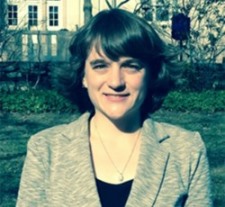 The woman studied by graduate student Allison B. Horrocks had a different, though equally groundbreaking life. Flemmie Kittrell (1904-1980) was a pioneer in the effort to establish the legitimacy of the study of home economics. The first African American woman to earn a PhD in that field, Kittrell taught the subject at many black institutions. But her work, according to Horrocks’ research, did not begin and end on college campuses. Kittrell developed home economics programs abroad. As the dissertation, titled “”Good Will Ambassador with a Cookbook,” points out, because of Kittrell’s accomplishments, her work should be viewed as providing a new understanding of women’s activism, gender politics and the legitimacy of the field of home economics in higher education and politics.
The woman studied by graduate student Allison B. Horrocks had a different, though equally groundbreaking life. Flemmie Kittrell (1904-1980) was a pioneer in the effort to establish the legitimacy of the study of home economics. The first African American woman to earn a PhD in that field, Kittrell taught the subject at many black institutions. But her work, according to Horrocks’ research, did not begin and end on college campuses. Kittrell developed home economics programs abroad. As the dissertation, titled “”Good Will Ambassador with a Cookbook,” points out, because of Kittrell’s accomplishments, her work should be viewed as providing a new understanding of women’s activism, gender politics and the legitimacy of the field of home economics in higher education and politics.
Anthony Antonucci’s dissertation examines the evolution of the relationship between the Mezzogiorno region of southern Italy (centered around the city of Naples) and the United State, dating back to 1785 when Thomas Jefferson was U.S. Minister to France, through author Herman Melville’s visit to Italy in 1857, six years after the publication of “Moby Dick.” The exchange of goods and ideas between the two regions “exerted a substantive influence on the economic and cultural development of both countries,” he writes of his thesis titled in part, “Americans and the Mezzogiorno: United States Relations with the Kingdom of the Two Sicilies.” Though largely overlooked, the examination of how Americans and southern Italians viewed and related to each other “offers a larger understanding of both cultures” of the late 18th and 19th centuries.
The depth and breadth of historical research becomes even clearer when one considers the dissertation  of Linda Meditz who chose to do a close examination of the life of Stephen Williams, through his own words. Titled “Captive: Piety and Ministry in the Diary and Life of Stephen Williams,” Meditz provides a close reading and analysis of Williams’ 4,000 page diary, which starts in1715 when he had just graduated from Harvard and ends in 1782, a week prior to his death. Though other scholars have concentrated on Williams’ comments on events of the period, Meditz focuses on the personal aspects of his inner piety and his belief that he was inadequate for the spiritual life. The diary, which Meditz calls “a hybrid literary form,” because of its mix of styles and materials, served as a “spiritual discipline,” through which the pastor looked into his soul and dealt with his self-doubts.
of Linda Meditz who chose to do a close examination of the life of Stephen Williams, through his own words. Titled “Captive: Piety and Ministry in the Diary and Life of Stephen Williams,” Meditz provides a close reading and analysis of Williams’ 4,000 page diary, which starts in1715 when he had just graduated from Harvard and ends in 1782, a week prior to his death. Though other scholars have concentrated on Williams’ comments on events of the period, Meditz focuses on the personal aspects of his inner piety and his belief that he was inadequate for the spiritual life. The diary, which Meditz calls “a hybrid literary form,” because of its mix of styles and materials, served as a “spiritual discipline,” through which the pastor looked into his soul and dealt with his self-doubts.
So there you have it: Four commendable scholarly works that take readers from international cities to the innermost workings of an individual’s soul. The results represent years of study, research, writing and rewriting by the four new PhDs, who have brought pride to their department and faculty mentors, and enlightenment to the field of history.
by Terese Karmel
Department of Journalism
PhD candidate Michael Limberg nominated to CT Academy of Arts and Sciences
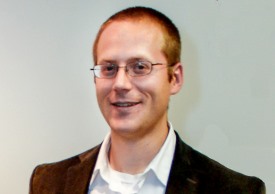
Chartered in 1799 “…to cultivate every art and science which may tend to advance the interest and happiness of a free and virtuous people…” The Connecticut Academy of the Arts and Sciences is the third-oldest learned society in the United States. Its purpose is the dissemination of scholarly information. For the past 200 years, the Academy has fulfilled this mission through lectures and extensive publications. (from the CAAS website)
Michael Limberg was nominated to the Academy in September 2015. He is UConn’s first Graduate Fellow.
Limberg’s dissertation focuses on the efforts of a network of U.S. missionaries, philanthropists, and diplomats to encourage economic and social development in Turkey, Lebanon, and Palestine during the 1920s and 1930s.
9/1 – Annual History Grad Student Research Conference
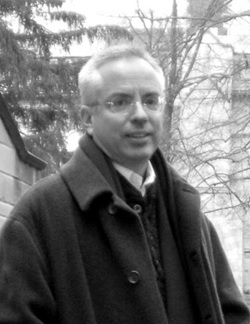 Please join us Tuesday, September 1 for the 9th Annual Graduate Student Research Conference!
Please join us Tuesday, September 1 for the 9th Annual Graduate Student Research Conference!
The conference will be held in the Class of 1947 Room in the Babbidge Library.
1:30-3:00 Session 1: The Stories People Tell
Chair: Mary-Katherine Duncan
Brotherly Love, Sisterly Affection: Narratives of Race, Respectability, and Prostitution in Mid-Nineteenth-Century Philadelphia – Carolyn Levy
Constructing Samuel J. Battle: Black “Firsts” and the Integration of the New York City Police Department – Matthew Guariglia
To Dance or Not To Dance? British Veterans and the Emotional Legacies of Armistice Day, 1918-1925 – Nick Hurley
Commentator: Jeffrey Egan
3:15-4:30 Session 2: Environmental Diplomacy in U.S. Foreign Relations History During the Cold War
Chair: Erica Willis
Exploring an Unknown: The American National Security Concerns of the International Indian Ocean Expedition – Marc Anthony Reyes
Lines in the Water: Territorial Sovereignty, Resource Nationalism, and U.S.-Ecuadorian Relations, 1968-1973 – Shaine Scarminach
Commentator: Olga Koulisis
4:30-5:00 Coffee Break
5:00 KEYNOTE ADDRESS
Introduction of Speaker: Frank Costigliola
“Turning a Thesis into a Story: Writing to Get Published”
Keynote speaker: Nick Cullather, Professor of History and International Studies, Indiana University; Co-editor, Diplomatic History
Professor Cullather is an historian of United States foreign relations specializing in the history of intelligence, development, and nation-building. His current research investigates the early history of the CIA, and asks why a country so committed to pluralism and the marketplace of ideas staked its security on the novel notion of central intelligence.
